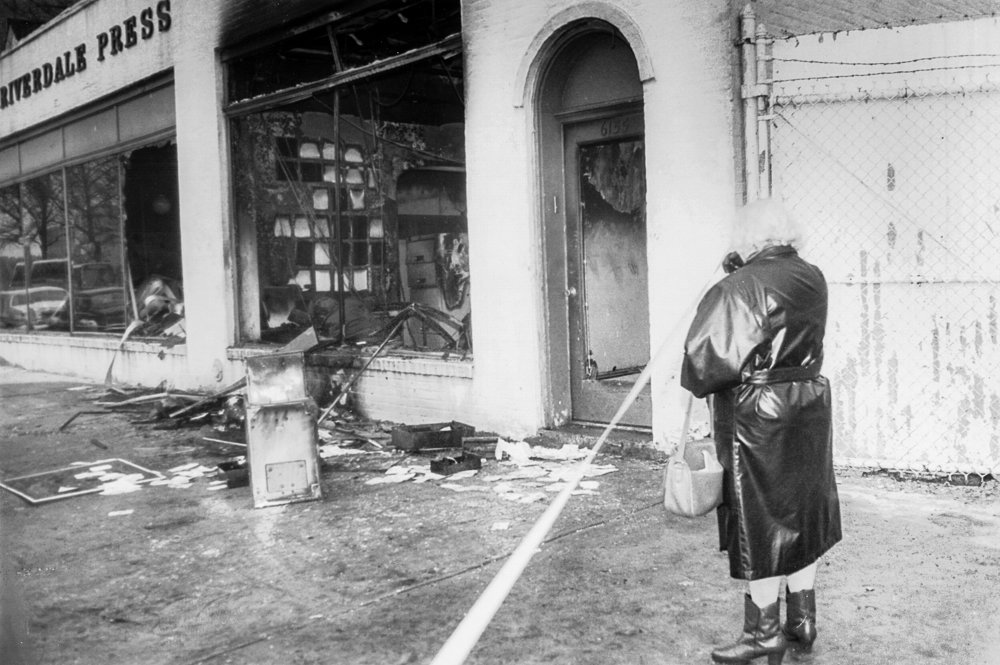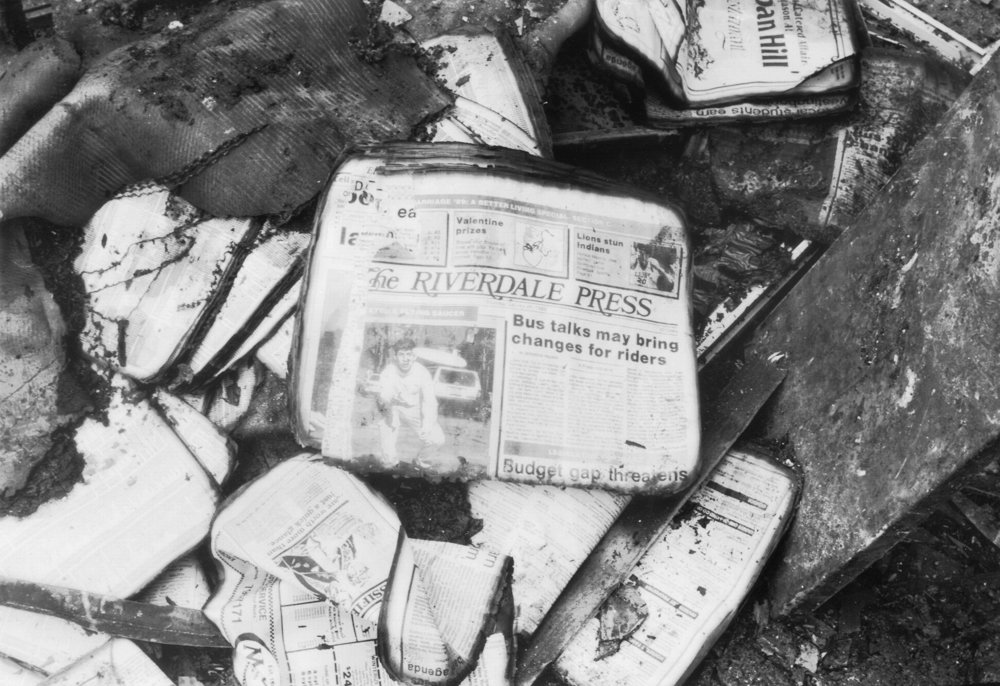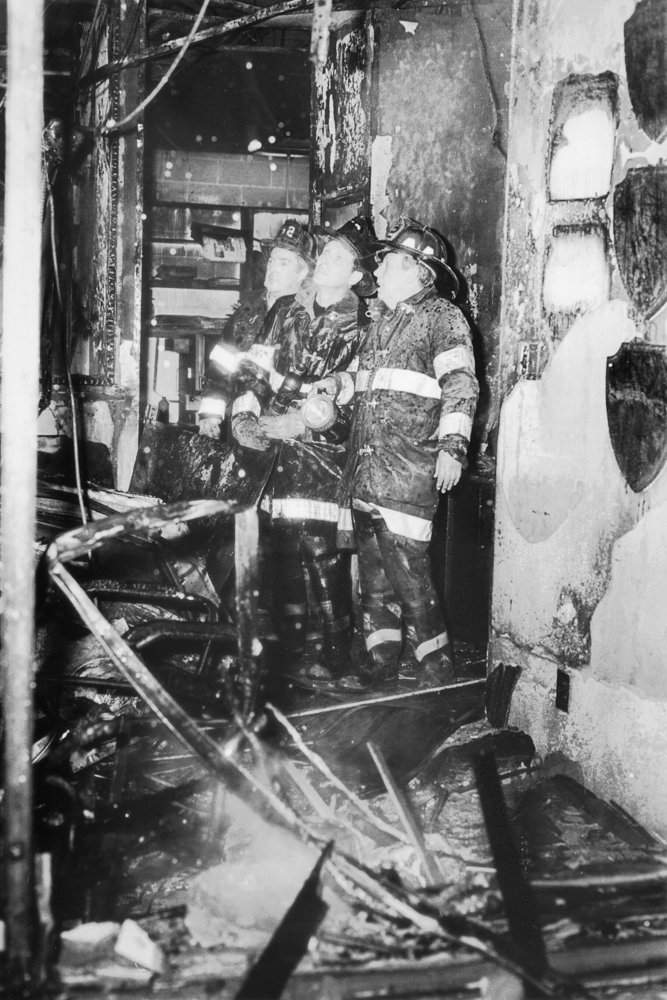Press firebombing: Unthinkable hits close to home
Richie Stein was having a bad night.
Feb. 28, 1989, was just a few hours old, and Richie was wide awake, his wife sleeping soundly next to him.
He had just finished piecing back together a school science project for his son, a sixth-grader at Ethical Culture Fieldston, that had literally exploded in his kitchen. It was a father-son project that turned into a whole-family project, and now he just wanted to close his eyes before he had to shift his attention to the newspaper production deadline later that morning.
But then the phone rang. It was the company that recently installed a new security system at The Riverdale Press offices, and a fire alarm had been tripped.
“It was a fairly new alarm, and we were getting constant false burglar alarms,” said Richie, who was co-publisher and general manager of the newspaper at the time. “The police would come out every time, and they were really getting angry with us. So I was going to tell them that it was a false alarm.”
But then his mother, Celia Stein, called. The security company had phoned her, too, but she wasn’t ready to dismiss it like Richie.
“No, no, you must go down there and check it out,” Celia told her son.
Richie made his way to 6155 Broadway just before sunrise, and stopped dead in his tracks. Firefighters were already in front of the building, and smoke was visible. The newspaper’s photographer, Gretchen McHugh, was already there, thanks to a tip she received from the fire department in the middle of the night.
The Riverdale Press was on fire. That took Richie a few minutes to process.
The Riverdale Press was on fire.
No time to rest
Tom Watson was having a good night.
The newspaper’s deputy editor had finished most of the paper earlier that day, save for the front page and a few others, and sleep couldn’t come soon enough for him now that night had fallen.
But then the phone rang. It was his boss, Press editor and co-publisher Buddy Stein.
“When the phone rings that early in the morning,” Watson said, “you know it’s going to be bad news.”
The Press had been firebombed, Buddy said. The building was on fire. But go back to sleep, and the newsroom will regroup later that morning.
“I didn’t say that much on the phone, and I hung up,” Watson said. “That split second — still not really awake — I accepted the idea of going back to sleep, which was ridiculous.
“I sped down there, and parked about a block away. I ran up to the barricades, and there was Buddy and Ceil and Richie, and I think at least two of our photographers. It didn’t take the firefighters long to put the fire out, but the damage was vast.”
Just a short time earlier, according to reports, a man stopped his car in front of The Press office on Broadway south of West 251st Street, and hurled two Molotov cocktails through the front plate glass window. The building, a former appliance store that had been home to John J. Shea Plumbing & Heating, was bought by Celia and her husband, David Stein, in March 1967, and had been the headquarters for The Riverdale Press ever since.
Two paramedics sitting in an ambulance nearby — Antonio Santana and Richard Harrison — watched as the alleged bomber raced back to his car, and sped north on Broadway, sideswiping their ambulance in the process. Santana and Harrison chased after the car, while at the same time calling in the fire on their radio. They lost sight of the car, however, once it made it onto the Henry Hudson Parkway.
The Rushdie conundrum
Later, as firefighters rolled their hoses and packed up, the Stein family was surrounded by media, concerned readers, and even politicians like Mayor Ed Koch. The Steins knew their Broadway offices were destroyed, but what they didn’t know was by whom — and why.
“It was not the only time The Press was threatened,” Buddy said. “In the months before the bombing, somebody had been shooting BBs or .22s into the plate glass window in the front. And there had been phone calls and nasty notes.”
Larry Dublin, who was in charge of the Better Living section, remembers when someone heaved a rock through that very window.
“The sense was that Buddy was writing editorials that were getting people upset,” said Dublin, now an elementary school teacher in Connecticut. “I was a big fan of all his editorials, but not everyone was.”
In fact, investigators quickly zeroed in on Buddy’s editorials, and feared one in particular might have sent someone over the edge. One detective asked Buddy point-blank: “Have you written anything about Salman Rushdie lately?”
Rushdie is an award-winning Indian-born British novelist who dominated headlines when Iran’s supreme leader, Ayatollah Ruhollah Khomeini, demanded he be killed for his 1988 novel “The Satanic Verses.” Muslims took offense to Rushdie’s depiction of Islam founder and prophet Muhammad, and the ayatollah demanded death for such a sacrilege.
Threats were not just made to Rushdie, but also to anyone who supported the book in any way, including bookstores that sold “Satanic Verses.” Fearing for their own safety, many of the biggest bookstore chains at the time — B. Dalton, Waldenbooks and Barnes & Noble — pulled “Satanic Verses” off shelves.
But not Paperbacks Plus, an independent bookseller on Riverdale Avenue where Corner Café is now. Fern Jaffe, who owned the bookstore, wasn’t ready to censor Rushdie, and Buddy picked up his pen to commend her for it.
The Opinion page in the Feb. 23 edition was led by the headline, “The tyrant and his chains.”
“The chain store executives excuse their surrender to the ayatollah by expressing concern for the well-being of their employees,” Buddy wrote. “But by knuckling under, they’ve put others at risk. If a threat can knock the books from the shelves of the ‘Big Three,’ terrorists may reason, think what a bomb in an uncompliant bookstore could do.”
Instead, Buddy was standing in front of the charred building that just hours before had been the home to The Riverdale Press. His mother — who proudly purchased the building with her now late husband more than two decades before — wept at his side at the sight of the destruction.
A reporter, however, tapped Celia on the shoulder. “What’s going to happen next?”
Celia quickly gained her composure, and didn’t miss a beat. “Next,” she snapped, “we’re going to put out a paper. We’ve never missed a deadline, and we’re not going to start now.”
Beating the deadline clock
That was easier said than done. Luckily, the Steins owned a typesetting shop on West 238th Street, across from An Beal Bocht Café, known as We’re Your Type. It not only did professional printing, but it handled the publishing needs of The Riverdale Press, too.
Because the paper was on deadline when its offices burned, many of the finished pages already were at West 238th, ready to print. It also became the secret temporary headquarters for The Press, and it’s where one-time intern and Horace Mann graduate Tami Luhby showed up to help.
She was a freshman at Columbia University getting breakfast at one of the dining halls when one of her friends, a commuter student, shared the firebombing news she heard on the car radio.
Luhby zipped through her morning classes as fast as she could before racing back to the Bronx.
“I was just helping them do whatever they needed me to do to help,” said Luhby, who now writes for CNN’s New York bureau. “We were just basically gathering at the shop, carrying in computers and anything else we could find. Even personal computers, like Larry Dublin’s, from his place right around the corner.”
By then, Buddy Stein and Tom Watson were there, frantically building a new front page with bold type typically reserved for the start of wars: “Press firebombed.”
Although The Riverdale Press officially publishes each Thursday, even back in 1989, the paper still first hit newsstands on Wednesday, which gave the paper an unusual advantage.
“That was an incredible period of pride for me,” Luhby said. “It happened on a Tuesday, and we were reporting on our own firebombing on the same day as the dailies.”
Buddy, however, found himself having to set all of his emotions, all of his pain, all of his fear, aside.
“It wasn’t easy to continue,” he said. “It was scary. We had cops at my home and at Richie’s home. Policemen stationed in front of our homes, 24 hours a day, for two or three weeks after the bombing.”
Buddy knew he had to be strong. He knew Richie had to be strong. The newsroom had to be strong — journalists know that no matter how they’re threatened, they must continue.
“But what about the rest of the staff?” Buddy asked. “The people in our production facility, they didn’t sign on for this. The classified department didn’t sign on for this. The receptionist didn’t sign on for this.”
The weary leader gave all of them a very generous out, letting each of them walk away if they so chose, without any penalty.
“Not one of them took us up on that offer,” Buddy said.
Not an isolated incident
Letters and phone calls poured in not just from around New York City, but from all over the state, and even around the country. The news had even crossed international borders, with one traveler later telling Richie Stein he watched news of the firebombing on a Chinese television station.
Days later, Rabbi Avi Weiss — who before the firebombing was threatening to picket the newspaper — instead organized a rally in front of the boarded-up offices. Koch was there, as were other candidates in that year’s mayoral race like Rudy Giuliani. Buddy overlooked a sea of umbrellas for the 200 or so people who braved the near-spring rain.
By then, it wasn’t just The Riverdale Press that had challenged bookstores in censoring Salman Rushdie. Hundreds of newspapers across the country picked up “The tyrant and his chains,” proving opinions can’t be silenced.
“If the bombers were trying to stop us from speaking out on this, it backfired,” Buddy said. “My guess is that instead of just 12,000 or 13,000 readers of The Riverdale Press seeing it, probably a million people read it.”
Just as Celia Stein had declared, The Riverdale Press didn’t miss that week, or the next week, or any weeks after that. While the firebombing may have put this part of the Bronx on the world map for a short time, Richie quickly learned how what happened to his family’s newspaper was far from unique.
“So many people would come forward and tell us their own stories about violence against their newspapers,” Richie said. “Like a Jewish paper in Staten Island where the editor’s car was firebombed. People at papers in rural areas, including one where somebody had backed into the front window of a local paper. Shootings. Assaults. Firebombings. It’s much scarier to be a journalist than I even realized.
“And this is in the United States.”
Feisty aftermath
By October 1989, The Riverdale Press officially returned to 6155 Broadway. Gone were the boarded windows and charred offices. Instead, a freshly rebuilt interior welcomed staff and visitors. It would remain the newspaper’s home until 2013 when the Stein family sold building and land to a developer, who in turn built a six-story apartment building on the site called The Park.
Few remnants, outside of yellowed newspapers and a few singed reference books, remain from the firebombing. A severely burnt award plaque from the New York Press Association — kept as a representative of all the award plaques lost in the fire — now hangs at Buddy Stein’s Fieldston home. A melted conglomeration of rubber stamps, coins and keys found in the receptionist’s desk drawer is something Richie Stein still holds on to.
The man or men responsible for the firebombing were never found. The $50,000 award offered by Mayor Koch and New York City’s biggest dailies at the time for information leading to the perpetrators’ arrest was never claimed.
“I am just so grateful that nobody got hurt,” Richie said. “No fireman got a beam on his head. Nobody was walking by and got hit with an accelerant. Those are things that go through your mind.”
Larry Dublin is probably the most grateful for that. He remembers a couch that used to sit right near the front window, and more often than not, it would serve as a place for him to sleep when he had to stay late some Monday nights.
“That couch was incinerated by the fire,” Dublin said. “Whoever threw that Molotov cocktail probably didn’t think there would be anyone in the offices that late. But it was a Monday night, and I could’ve very well been there. I’m just incredibly grateful that I wasn’t.”
In the immediate aftermath, Buddy says tears only flowed for him once, after learning his nephew had broken down crying at school.
What happened on Feb. 28, 1989, at least for its victims, is something that can never be forgotten.
“It was terrifying,” Buddy said. “It was very difficult just to get the work done the next day. And we still had the next week.”
But if Celia Stein was scared, she never let anyone see it. In fact, the paper would run subscription advertisements for months afterward, topped with a picture of The Riverdale Press front page reporting the firebombing, and a quote that could really come from no one other than the paper’s matriarch.
“We were feisty before. We’ll be even feistier now!”











